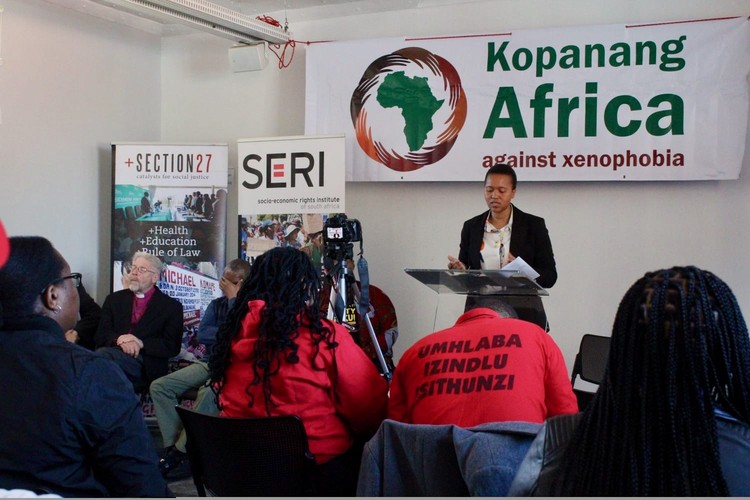
25 May 2023
Nomzamo Zondo of the Social Economic Rights Institute of South Africa (SERI) at the media briefing on its court action against Operation Dudula, at the Women’s Jail, Constitutional Hill, on Wednesday. Photo: Kimberly Mutandiro
The Social Economic Rights Institute of South Africa (SERI) is seeking an interdict against Operation Dudula on behalf of various immigrant organisations, including Kopanang Africa Against Xenophobia, South African Informal Traders Forum and the Inner-City Federation, and also Abahlali BaseMjondolo.
In court papers the organisations seek to stop the anti-immigrant movement from xenophobic and racist speech and conduct, and violating the rights of foreign nationals living in South Africa.
Relief is also being sought against various state authorities for failing to execute their duties in the face of actions by Operation Dudula.
The respondents are Zandile Dabula and Dan Radebe of Operation Dudula. Also included are the South African government, the ministers for police, justice, health, basic education, and the South African Human Rights Commission.
The interdict being sought would prohibit Operation Dudula from intimidating and harassing people, demanding to check identity documents, forcing businesses to close, preventing informal traders from operating, evicting people from their homes without a court order, wearing uniforms resembling those of the police and army, denying people access to healthcare, and removing students and teachers from schools because of their nationality.
The application asks the court to declare that only an immigration officer or police officer has the power in terms of the Immigration Act to demand that a person produce documents to demonstrate their right to be in the country, and that no private person has the power to do so unless expressly so authorised by law.
The applicants also say the South African Police Service has breached its constitutional duties to uphold and enforce the law when it was violated by Operation Dudula.
The applicants want to interdict the police and Department of Home Affairs from working with Operation Dudula in conducting raids on immigrant communities.
At a media briefing, Nomzamo Zondo of SERI said the organisation had been threatened with violence by members of Operation Dudula after it launched a case last year on behalf of informal traders who had been chased off the streets. She said there was a need to protect witnesses in the light of Dudula’s history of violence.
The applicants are seeking a special order to protect the identities of about 40 individuals who gave affidavit evidence about Operation Dudula’s unlawful conduct.
The applicants want the court to order that the government fully implement plans against racism and xenophobia.
“What we have not seen is the government taking concrete steps to address xenophobia,” said Zondo.
Sharon Ekambaram, manager for Lawyers for Human Rights’s refugee and migrants program, called for an end to the tolerance of Operation Dudula’s “criminal vigilante bullying tactics” and for the police to take action.
She called on activists to unite and keep a watchful eye on the court case as it proceeds as a show of unity. This would help “stop the rot of xenophobic scapegoating and government complicity in the false narrative around who is to blame for poverty, inequality, and poor service delivery,” she said.
GroundUp has reported on various incidents where immigrants have been evicted from their homes and chased away from clinics, and where immigrant informal traders were stopped from trading by members of Operation Dudula.
Zandile Dabula, Operation Dudula national spokesperson, said, “Under normal circumstances Operation Dudula would not be responding to attention seeking fraudsters masquerading as NGOs.”
“The case by SERI and Kopanang is a desperate attempt to silence Operation Dudula and government to arrest these criminals using [trading] stalls to peddle drugs and counterfeit goods.”
“Operation Dudula is at its final stages of collecting evidence to prove perjury and fraud committed by these two organisations. These two organisations will soon be exposed, their time is up.”